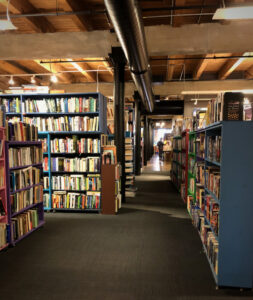
Photo by John Griswold
Yesterday was national Independent Bookstore Day, which the Boston Globe says was first “put on by the Southern California Independent Booksellers Association” in 2014. I did not know there was such a promotional event until it was over, but anything that helps preserve our national reserve of independent bookstores and saves us from the mediocrity of chain stores and mega-corporations is alright by me.
As it happened, I was in Chicago the last couple of days thinking bookish thoughts anyway, and on my own checked to see if any of my favorite stores were still open. Some years ago I lived in Chicagoland and even worked at the venerable Kroch’s and Brentano’s for a short time.
Kroch’s of course is long gone—they had a hard time getting on board with that whole computer inventory thing when it came along—along with others I can’t even remember the names of. (What was that wonderful used bookstore down by the El tracks and the original Devil Dawgs, where I first bought George Steiner’s books?) I worry about what happened to the owners of stores like those when rents went up too high, and the chains undercut their business. All were kings and queens of their dusty rooms, a few were crabby because people came to look at their books, and one shouted at me because I pulled a three-dollar book off the shelf with an index finger, which could have damaged its foxed old spine. I miss them all.
The US Census shows that the number of US bookstores dropped by half from 1998 to 2019, the most recent data. The Feds describe bookstores in the digital age as an institution “harken[ing] back to simpler times” but seem happy to report that there were still more bookstores (6,045) that year that employed workers than there were home centers (5,952) or department stores (3,856)—and another 8,109 “nonemployer” bookstores that were one-person operations.
Like most other businesses, some bookstores also took a hit from COVID, but by October 2021 sales had rebounded and exceeded those of 2019 (a billion dollars nationally) by at least another $200 million.
In Chicago I headed down to the West Loop to Open Books, one of the stores run by a larger nonprofit organization that donates books and runs literacy programs around the city. When I walked in I involuntarily sighed heavily, the way you do after a good cry or coming up from underwater. The store has about 60,000 volumes, most of which are donated, and they are catalogued and meticulously organized by section and author in an attractive floor plan with wide aisles and great lighting. Above all, the curation is terrific.
The tables near the front display cover-up picks (Rebecca Solnit’s nonfiction bildungsroman; Jane Jacobs on the death and life of American cities; Alexandra Horowitz on looking; Saul Alinsky on organizing) and are ringed by wall shelves with the wonderful welter of older titles that you find only by browsing in a physical store (Kingsley Amis on Austen and other topics [which came home with me], Moss Hart’s autobiography, Einstein on humanism, Baldwin’s No Name in the Street, Angela Davis on arrest and incarceration).
If you started life in a place where bookstores were thin on the ground, and it was a big deal that the mall the next town over sold Orange Juliuses with a raw egg if you wanted, and if, now, you live in a town with only a chain store that seems to sell as many greeting cards, Funko Pop characters, and novelty candies as it does books, wandering into an honest-to-god independent bookstore is like grace, like being returned to your people, like home.
